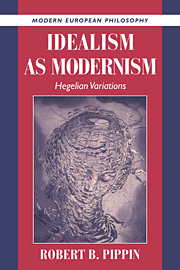Book contents
- Frontmatter
- Contents
- Acknowledgments
- Abbreviations
- Dedication
- 1 Introduction: Hegelianism?
- Part One The Original Options: Kant Versus Hegel
- 2 Kant on the Spontaneity of Mind
- 3 On the Moral Foundations of Kant's Rechtslehre
- 4 Hegel, Ethical Reasons, Kantian Rejoinders
- 5 Avoiding German Idealism: Kant, Hegel, and the Reflective Judgment Problem
- Part Two Critical Modernism
- Part Three Greeks, Germans, and Moderns
- Part Four Narrating Modernity
- Part Five Modernism and Nihilism
- Part Six Heidegger's “Cuhnination”
- Part Seven Hegelianism
- Name Index
- Subject Index
2 - Kant on the Spontaneity of Mind
Published online by Cambridge University Press: 05 June 2012
- Frontmatter
- Contents
- Acknowledgments
- Abbreviations
- Dedication
- 1 Introduction: Hegelianism?
- Part One The Original Options: Kant Versus Hegel
- 2 Kant on the Spontaneity of Mind
- 3 On the Moral Foundations of Kant's Rechtslehre
- 4 Hegel, Ethical Reasons, Kantian Rejoinders
- 5 Avoiding German Idealism: Kant, Hegel, and the Reflective Judgment Problem
- Part Two Critical Modernism
- Part Three Greeks, Germans, and Moderns
- Part Four Narrating Modernity
- Part Five Modernism and Nihilism
- Part Six Heidegger's “Cuhnination”
- Part Seven Hegelianism
- Name Index
- Subject Index
Summary
In the Critique of Pure Reason, Kant refers often and with no apparent hesitation or sense of ambiguity to the mind (das Gemüt). He does so not only in his justly famous destruction of rationalist proofs of immaterialism, but throughout his own positive, transcendental account in the Transcendental Aesthetic and Transcendental Analytic. In the first edition of the Critique, he even proposed what he adventurously called a “transcendental psychology,” and, although this strange discipline seemed to disappear in the second edition, he left in that edition all his frequent references to forms “lying in the mind,” and to the mind, or the self, or the subject of experience, or the ego, doing this or that. Curiously, though, despite an extensive secondary literature, there is in that literature relatively little discussion of what these expressions, in a proper, strictly Kantian sense, are supposed to refer to. There are two imaginative, extremely suggestive articles by Sellars, some hints at connections with eighteenth-century psychology offered by Weldon, a tenebrous book by Heidemann, and some recent attention to the general issue of “Kant's theory of mind” by Ameriks and Kitcher.
- Type
- Chapter
- Information
- Idealism as ModernismHegelian Variations, pp. 29 - 55Publisher: Cambridge University PressPrint publication year: 1997
- 18
- Cited by

